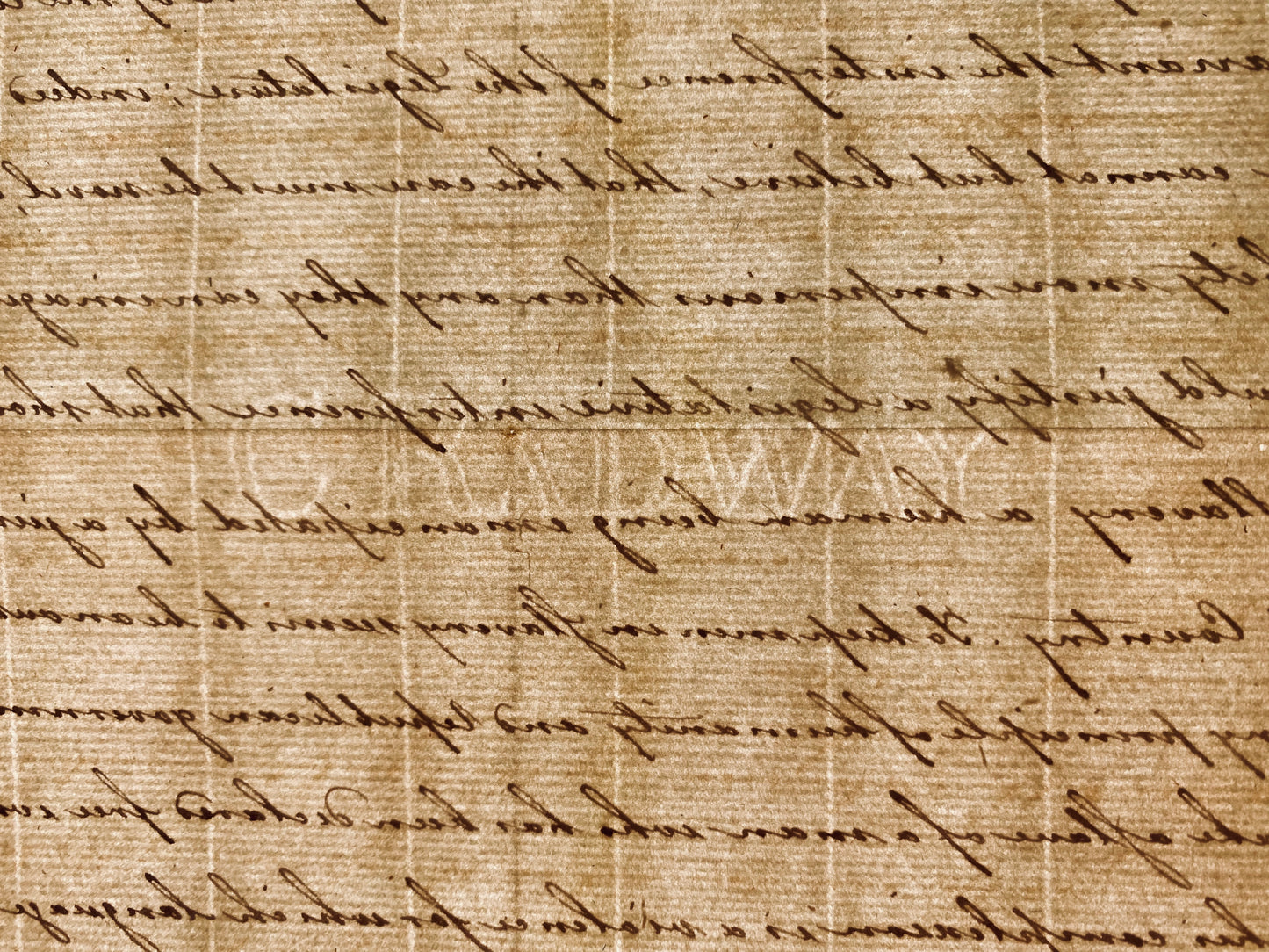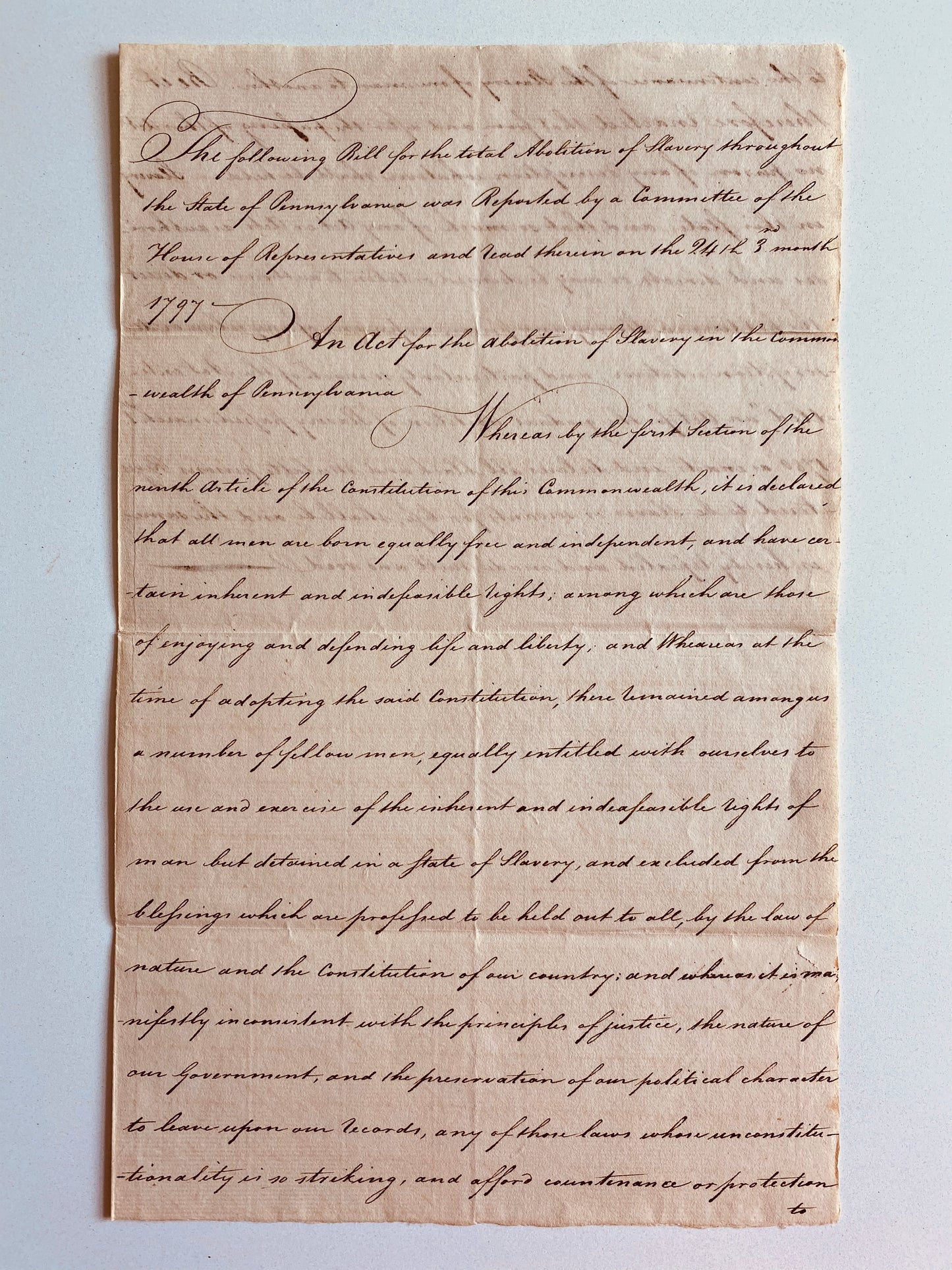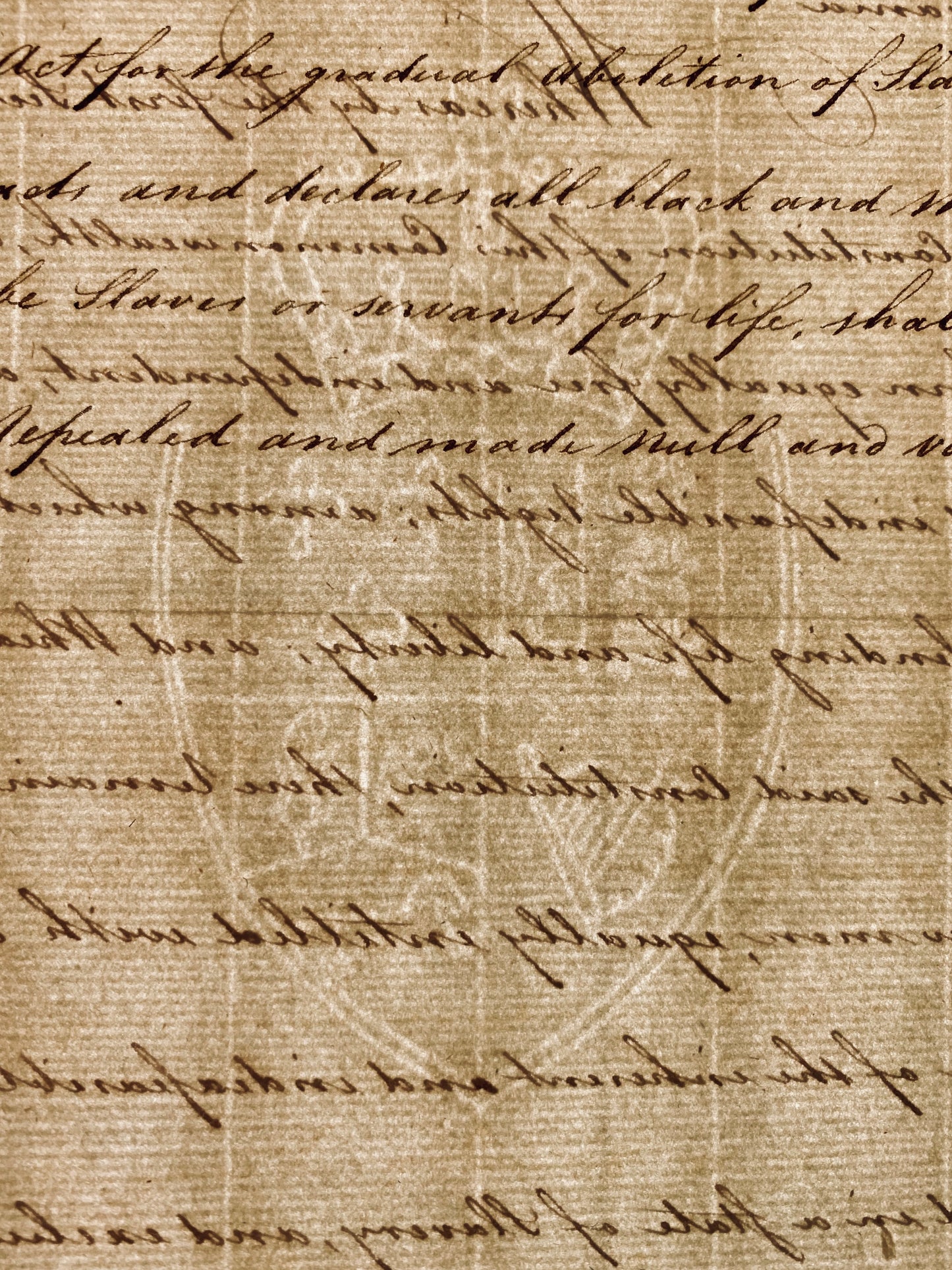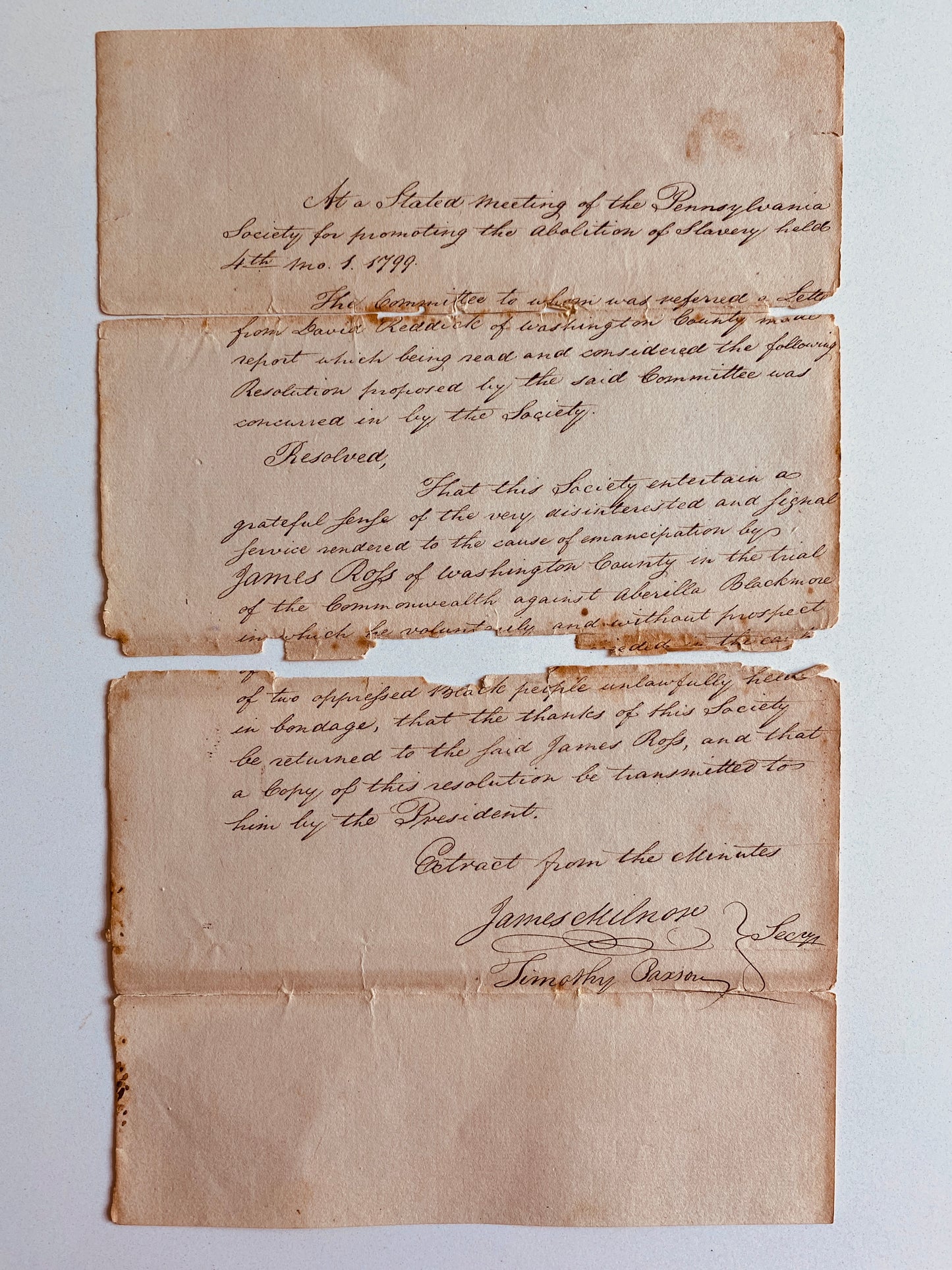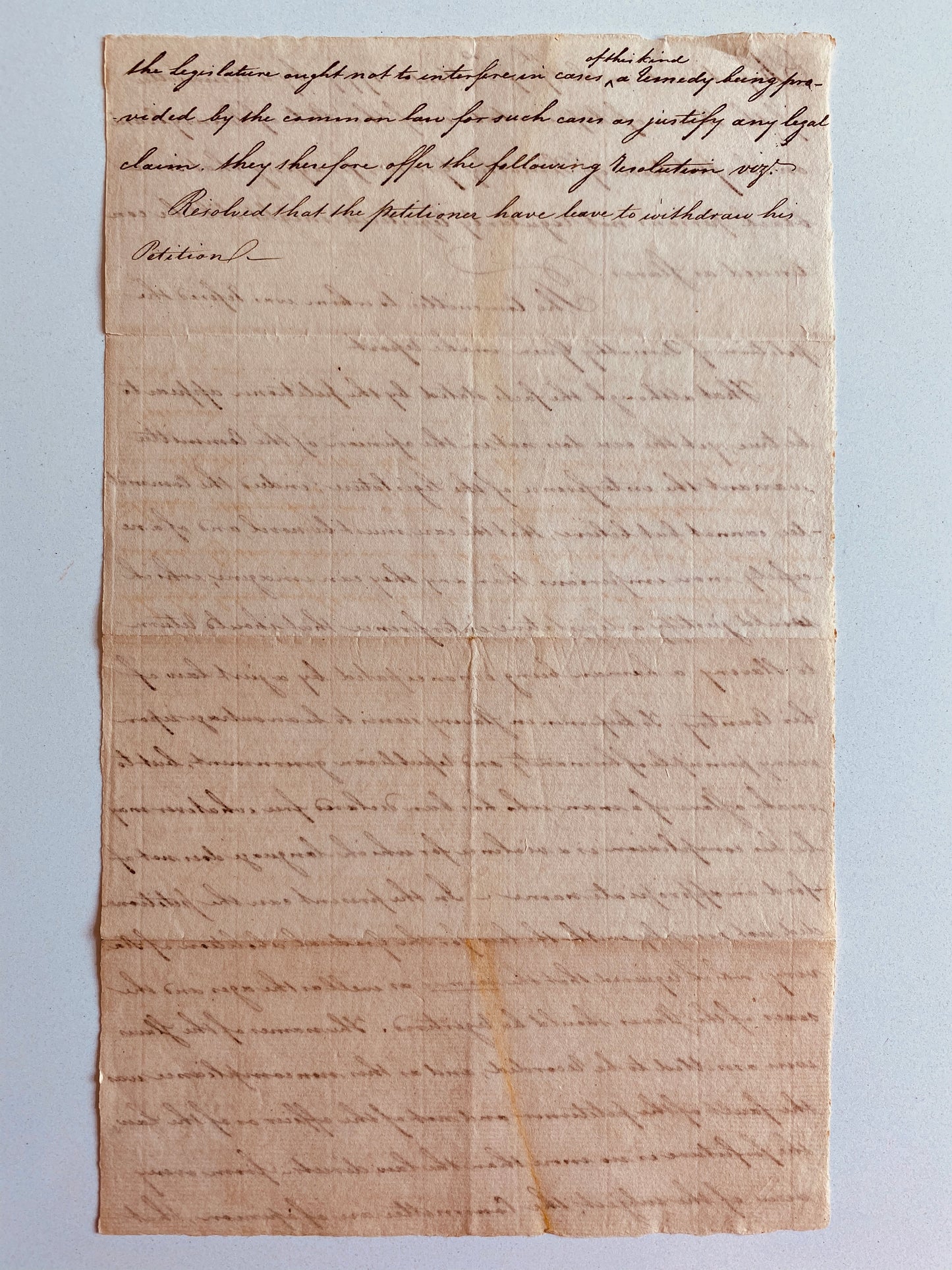Specs Fine Books
1797 ABOLITION. Correspondence between 1st Abolition Society in America & William Wilberforce & Co. Amazing!
1797 ABOLITION. Correspondence between 1st Abolition Society in America & William Wilberforce & Co. Amazing!
Couldn't load pickup availability
An incredible small archive of four documents from the first Abolition society in America corresponding and strategizing with the London Society, including Granville Sharpe, William Wilberforce, Hannah More, etc.,
The records of the Pennsylvania Society for Promoting the Abolition of Slavery have long been institutionally held. Anything connected to them on the open market is of the utmost scarcity and desirable because of the Institutions ground-breaking role in the cause of emancipation. Not only was the organization the first Abolitionist Society in the United States, but it has previousely been headed by Benjamin Franklin, who was its President during the late 1780's. It was during this period be raised the subject of slavery during the Constitutional Convention of 1787 at the behest of the Society.
The first three documents form an important set of correspondences between the Pennsylvania Society and the London Society, legislatively spearheaded by William Wilberforce, and ideologically by Granville Sharpe and others.
In the first letter, the American Society urgently desires the London Society have clarity about recent cases involving American slave traders so that the argument in Parliament that abolishing slavery in England will only strengthen the United States, whom they assumed to be thirsty for more revenge against the Crown. This was decidedly not the case legislatively and the Americans are keen to give the London Society proper information so that abolition in England is not set back. They further discuss the arrest of several slave runners who are American, but had been supplying slaves to other parts of the world, request records from Sierra Leone that would incriminate any Americans they could pursue on criminal charges, etc.,
The second is the report of a legislative case sent to the London Society as an example of how they were pursuing emancipation strategically in Pennsylvania. Knowing that immediate emancipation would not be tolerated, they first required that all slaves be registered according to strict regulation. Any breach of the process was immediately pursued. In the case of Timothy Green, recorded here, he failed to record his slave’s name on the register. The Society seized the non-compliance and won the emancipation of his slaves. They also forbad the import of new slaves. Essentially, they created a choke point where present slaves were being freed on technicalities, their children were not able to be enslaved, and new slaves could not be imported.
The third, my favorite of the bunch, is a communication to the London Society recording a critical piece of legislation put before the Pennsylvania Legislature, arguing for perhaps the first time in American history that the rights and privileges afforded to American citizens by the Constitution of the United States, and the State Constitution of Pennsylvania, belonged equally to black citizens, mulatto citizens, etc., It is a radical, pivotal argument that, when passed, paved the way for the ultimate abolition of slavery. All the rights argued for over the next 68 years, leading up to the Emancipation Proclamation, flowed out of that singular legislative idea.
The final document, not in sequence with the other three, is a wonderful original Society resolution celebrating famed abolitionist attorney, James Ross for his work in the emancipation of slaves.
Breathtaking to think of the critical moment, persons, and ideas being worked forward in these American documents; wonderful to think of them being sent to London, and arriving to be read by William Wilberforce, Hannah More, Granville Sharpe, and others. A wonderful little snapshot into anti-slavery history.
DOCUMENT ONE:
In a fine, flourished secretarial hand:
Philadelphia 4th Mo 26. 1797-
Respected Friends,
Although we lament your inability to move forward in the just and honourable cause you have been so long and so actively engaged in, yet we cannot suppose you are less anxious than formerly to do every thing in your power to promote it; and, it is from an apprehension that you may make an useful application of the intelligence that we now write more particularly to acquaint you with what has recently occurred amongst us. – We well know the stress which has been laid on an argument in favour of continuing the Slave-trade by the advocates there in the British Parliament; namely, that if Great Britain relinquish this trade the United States of America would not fail to profit of the occasion; and you most probably of late heard much to strengthen this argument. We see the force of it, and are sorry to say it is not without an appearance of foundation. – Avarice, the too constant attendant of Commerce, has induced many of our fellow Citizens, to carry on this trade in direct violation of the laws of our Country, and you are not to be told of the difficulty of procuring proof sufficient for the conviction of such as have offended against these laws. The evil was notorious. – At length after many and unwearied exertions, we commenced prosecutions, in a Society capacity, against to vessels in this part, which after due trial were condemned for having been concerned in supplying foreigners with Slaves, contrary to the Act of Congress of March 22d. 1794, a copy of which we send to you. Prosecutions are now carrying against the owners and Captains of the vessels. – Animated and encouraged by these exertions, the Abolition Societies of New York and Rhoad Island have severally communed prosecutions against divers vessels and their owners who have been engaged in similar practices: and we have good reason to hope they will be successful. –
It may not be necessary at present to be more particular, but as we are sensible of the injury that an improper Statement of facts might produce, we have judged it expedient to give you this general information, by which you may readily perceive that it is not from any defect in our laws, but merely from the insatiable thirst for gain, that such evils have existed.
We trust that encouraged by this hopeful beginning all the abolition Societies will stand ready to detect the crime and no longer suffer it to disgrace our land.
In our letter of 2d mo. 29th 1796 we particularly requested you would procure from the Directors of the Sierra Leone Company and transmit to us, the names and other circumstances respecting such Americans as have been concerned in this traffic. We now earnestly repeat this request; such information would be to us of the greatest importance.
Although there is nothing very particular to communicate respecting the Abolition of Slavery amongst us, yet we can truly and encouragingly say, that the business is going forward, and we believe, rapidly.
To give you some idea of the present prevailing opinion on this subect, we transmit two papers, which wholly originated in the Assembly of Pennsylvania.
The convention from the different Abolition Societies in the United States meet in this City on the third day of next month – we shall be careful to send you, as usual, a copy of their proceedings; from which you will learn the general State of the subject in America; and though you may not have much to communicate, yet we shall be pleased with an acknowledgement of the receipt of this, and of our former letter; as well as to have an account of your present situation.
You should not be too much discouraged, because you are for a time prevented from acting – works of righteousness and peace, will not fail to draw down a blessing on a Nation, as well as on individuals; and if we are all singly attentive to our duty, as the way is pointed out, we cannot be wrong whomsoever we may offend.
BY Order of the Pennsylvania Society for Promoting the Abolition of Slavery, &c. &c.
Committee of the Society Instituted at London for the Abolition of the Slave Trade.
DOCUMENT TWO:
In the same flourished, secretarial hand:
Report made on the 17th of 3rd Month 1797 by a Committee of the House of Representatives of the State of Pennsylvania on the Petition of Timothy Green, praying that some black persons not regularly registered might still be continued as Slaves.
The Committee to whom was referred the petition of Timothy Green make report:
That although the facts stated by the petitioner appear to be true, yet the case does not in the opinion of the Committee warrant the interference of the Legislature; indeed the Committee cannot but believe that the case must be novel, and of a necessity more imperious than any they can imagine, which would justify a legislative interference that should return to Slavery a human being emancipated by a just law of his Country. To keep men in Slavery seems to be an outrage upon every principle of humanity and republican government, but to make a slave of a man who has been declared free whatever may be his complexion is a violence for which language does not afford an appropriate name – In the present case the petitioner did not comply with the law for the Gradual abolition of Slavery, which required that the names as well as the ages and the sexes of the Slaves should be registered. The names of the Slaves were omitted to be recorded, and as this non-compliance was the fault of the petitioner and not of the officer of the Law, the forfeiture is no more than the law directs – from every view of the subject, the Committee are of the opinion, that the Legislature ought not to interfere in cases of this kind, a remedy being provided by the common law for such cases as justify any legal claim. They therefore offer the following resolution, viz.
Resolved that the petitioner have leave to withdraw his Petition.
DOCUMENT THREE:
In the same flourished, secretarial hand:
The following Bill for the total Abolition of Slavery throughout the state of Pennsylvania was Reported by a Committee of the House of Representatives and read therein on the 24th 3rd month 1797~
An Act for the abolition of Slavery in the Commonwealth of Pennsylvania
Whereas by the first Section of the ninth Article of the Constitution of this Commonwealth, it is declared that all men are born equally free and independent, and have certain inherent and indispensable rights; among which are those of enjoying and defending life and liberty; and Whereas at the time of adopting the said Constitution, there remained among us a number of fellow men, equally entitled with ourselves to the use and exercise of the inherent and indefeasible rights of man but detained in a State of Slavery, and excluded from the blessings which are professed to be held out to all, by the law of nation and the Constitution of our country; and whereas it is manifestly inconsistent with the principles of justice, the nature of our Government, and the preservation of our political character to leave upon our records, any of those laws whose unconstitutionality is so striking, and afford countenance or protection to the continuance of the Slavery of one man to another, Be it therefore Enacted that from and after the passing of this Act no person of any description whatever shall be held in Slavery in this State, and that so much of any Act or Acts as authorizes and directs, or may be deemed or taken to authorize or direct the holding in Slavery any person or persons of any colour or description whatever, and particularly so much of the Act entitled “an Act for the gradual abolition of Slavery” passed March 1 1780 as enacts and declares all black and mulatte persons Registered to be Slaves or servants for life, shall be, and the same is hereby repealed and made null and void.”
All three above documents on hand-laid Radway paper. A similar paper was in use by Thomas Jefferson in 1802, denoted as having a watermark with a quartered shield, with crown at head and three lions in one quarter, a lion in a second quarter, a harp in a third quarter, and a horse in the fourth. Further, two letters, dated to October and November 1797 from Bushrod Washington, George Washington’s nephew, to George Washington are on paper seemingly identical to our present manuscripts. Loc. Washington Library, Mount Vernon.
DOCUMENT FOUR:
At a Stated meeting of the Pennsylvania Society for Promoting the Abolition of Slavery held 4th mo 1. 1799.
The Committee to whom was referred a letter from David Reddick of Washington County made report which being read and considered the following Resolution proposed by the said Committee was concurred in by the Society,
Resolved,
That this Society entertain a grateful sense of the very disinterested and signal service rendered to the cause of emancipation by James Ross of Washington County in the trial of the Commonwealth against Aberilla Blackmore on which he voluntarily and without prospect ************************ of two oppressed Black people unlawfully held in bondage, that the thanks of this Society be returned to the Said James Ross, and that a Copy of this resolution be transmitted to him by the President.
Extract from the Minutes
James Milnor
Timothy Paxson
Secretaries
This item separated in four pieces with losses. A very important piece of history related to the legal battles waged by the Abolition societies in the cause of freed slaves. This particular case, one of the earliest of its kind, involved two slaves held in what was Pennsylvania. The Abolition society used a law border dispute between Virginia and Pennsylvania, where Slavery was being outlawed, to argue that slaves born there were actually under Pennsylvania jurisdiction, and thus liable to being released if they hadn’t registered, according to the laws of Pennsylvania.
The case of Aberilla Blackmore has been heavily researched and written about in the legal histories as a formative case in the toward emancipation.
James Ross [b.1762] studied under Rev. John McMillan, the noted revivalist, and then studied law, being admitted to the Bar, 1784. In 1789 he was selected to help draft the Constitution for the State of Pennsylvania. Revivalist such as him, along with a predominance of Quakers, put the abolition of the slave trade and of slavery itself at the forefront of their minds. He was then elected to the United States Senate and played a pivotal role in the end of the Whiskey Rebellion. Long a friend of George Washington, first as a General and then as a President, it was the Washington himself who requested Ross’ involvement. He advocated regularly, pro bono, on behalf of Slaves in the courts.
Share




